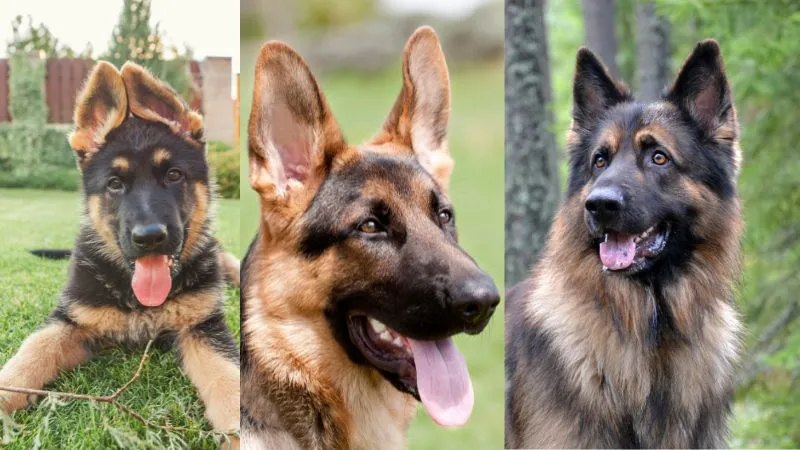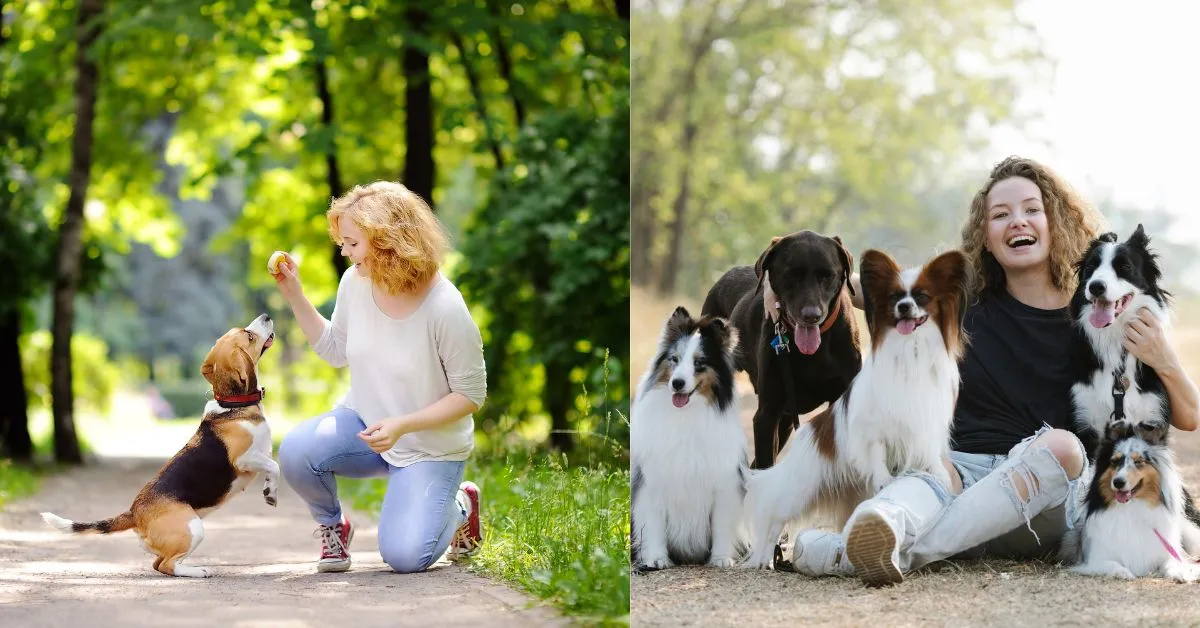German Shepherds are diagnosed for his or her talkative nature, often using several sounds such as barking, whining, and howling to proportion their feelings. Whether they’re full of power, feeling bored, or seeking interest, their vocalizations are their manner of expressing themselves.
As a brilliant breed, they rely on these noises to connect with their environment and communicate with their owners. If you’ve ever wondered why your German Shepherd makes so much noise, it’s their way of telling you how they feel. Understanding these sounds will help you know what they need and build a stronger connection with your dog.
Why are German Shepherds vocal?

German Shepherds showcase a brilliant tendency to vocalize, a characteristic from their historic position as running dogs, setting them aside from different breeds. Originally bred to guard and herd farm animals, those puppies have honed their vocal competencies as a crucial manner of communication with both their handlers and different animals.
This vocal behavior isn’t just by chance; it’s a well-developed trait honed through generations of selective breeding to enhance their ability to stay alert and communicate effectively.
Their high intelligence and imaginative nature position them as a few of the most astute dog breeds, enabling them to deliver emotions and thoughts through a variety of sounds, whether to alert their owners to ability risks or to interact in playful interactions. This vocal capacity has proven to be a big advantage, improving their functionality in both operating and family settings.
At what age do they start barking?
German Shepherd puppies start making whiny sounds as early as two weeks old. By 7-8 weeks, these baby dogs begin to find their voices and bark. As they approach 5-6 months old, this phase could be seen as canine puberty, where their vocal behavior becomes more pronounced.
The 15 Most Vocal Dog Breeds
Siberian Husky
- Origin: Siberia, Asia
- Lifespan: 12–15 years
- Height: 20–24 inches
- Known for vocalizations like singing; often featured in videos due to their ability to vocalize in unison.
- Vocalizations include barking, whining, howling, and screeching when excited or stressed.
German Shepherd
- Origin: Germany, Europe
- Lifespan: 9–13 years
- Height: 22–26 inches
- Utilized for herding, drug detection, and guarding; takes these jobs seriously even in stressful or exciting situations.
- Sounds include howls, whines, and grumbles.
Beagle
- Origin: United Kingdom, Europe
- Lifespan: 12–15 years
- Height: 13–16 inches
- Known for their alertness and loud vocalizations; excellent companions and hunters.
- Commonly bay and howl, suitable for apartment living due to moderate energy levels.
Basset Hound
- Origin: France, Belgium, Europe
- Lifespan: 10–12 years
- Height: 11–15 inches
- Weighs a large number of pounds; good-natured and connected with human families.
- Known for baying, howling, whining, and yelping.
Bloodhound
- Origin: Belgium, Europe
- Lifespan: 10–12 years
- Height: 23–27 inches
- Renowned scent hound for searches and rescues; athletic and sometimes stubborn.
- Vocalizes with howls and bays, and barks when excited, happy, or stressed.
Dachshund
- Origin: Germany, Europe
- Lifespan: 12–16 years
- Burrows into animals; bred to dig.
- Known as noise barkers with barking that appear like a larger dog’s, deceptive of their small size.
Australian Shepherd
- Origin: Spain, Europe
- Lifespan: 13–15 years
- Height: 18–23 inches
- Intelligent and trainable with a strong herding instinct towards farm animals and kids.
- Vocalizes when excited.
Alaskan Malamute
- Origin: United States, North America
- Lifespan: 10–14 years
- Height: 22–26 inches
- Cousin to the Husky, known for being talkative with vocalizations like singing, yelping, howling, and barking.
- Essential watchdog.
Pomeranian
- Origin: Germany, Europe
- Lifespan: 12–16 years
- Height: 7–12 inches
- Yappy reputation but sweet and loving; excellent at introducing guests to their property.
- Tough when barking, though friendly once familiar.
Chihuahua
- Origin: Mexico, Central America
- Lifespan: 12–20 years
- Height: 6–9 inches
- Fearless personality, known for their yippy bark and bravery even with larger animals.
- Requires supervision to avoid fighting with larger dogs.
Yorkshire Terrier
- Origin: United Kingdom, Europe
- Lifespan: 13–16 years
- Height: 6–7 inches
- Honest and affectionate; known for being noisy, especially towards larger dogs.
Fox Terrier
- Origin: United Kingdom, Europe
- Lifespan: 12–16 years
- Height: 10-15 inches
- Small, energetic breeds known for being yappy watchdogs.
- Loves to bark at prey during hunting.
Miniature Schnauzer
- Origin: Germany, Europe
- Lifespan: 12–14 years
- Height: 12–14 inches
- Sassy attitude and frequent barking make them effective watchdogs.
- Suited for apartment living with proper vocal training.
Miniature Pinscher
- Origin: Germany, Europe
- Lifespan: 12–16 years
- Height: 10–12 inches
- Sassy with a yappy attitude and excellent watchdog capabilities.
- Needs training for optimal vocalization control.
Shetland Sheepdog
- Origin: Scotland, Europe
- Lifespan: 12–13 years
- Height: 13–16 inches
- Highly intelligent and trainable; adept at herding and protecting people.
- Vocalizes readily when excited, but can be reserved.
Why Do German Shepherds Whine?

German Shepherds whine for various reasons like excitement, anxiety, or sadness. They might whine when they see you after being apart or if they feel scared or frustrated. The key to understanding their whine is knowing what’s happening at that moment, so you can tell if it’s due to pain or if they just want attention.
Why Do German Shepherds Howl?
Howling in German Shepherds is a natural behavior linked to their wild ancestors, the wolves. They may howl to announce their presence or get attention. Often, they do it in response to high-pitched sounds like sirens or music, showing their instinct to communicate over distances.
Why Does My German Shepherd Sigh?
A sigh from a German Shepherd often happens when they lie down after a busy day, showing they’re relaxed and content. Sometimes, a sigh can also mean disappointment, like when they don’t get something they were hoping for.
What Causes My German Shepherd to Grunt and Groan?
German Shepherds might grunt or groan when they feel annoyed, uncomfortable, or even tired. These sounds can also happen due to health issues, especially in older dogs, like arthritis, which makes it painful to move or settle down.
Why Doesn’t My German Shepherd Bark?
Some German Shepherds are naturally quiet, either because they have a calm personality or they might have been trained not to bark. Some may be shy, reserved, or hesitant because they were punished for barking in the past.
How to Make a German Shepherd Bark
You can teach your German Shepherd to bark on command by using specific cues, like meal time. Use the command speak and reward them when they bark, so they learn to associate the word with barking.
Encourage German Shepherds to Bark at Strangers
To train your German Shepherd to bark at strangers, give them a treat or reward when they bark as someone enters your home. With consistent training, they’ll learn to alert you to newcomers without becoming too aggressive.
Should I Train My German Shepherd to Stop Barking?
Yes, it’s important to teach your German Shepherd when to stop barking, especially to avoid problems with neighbors or stress in the household. Training them to understand the right time to bark helps control excessive noise.
What Is Excessive Barking a Sign Of?
Too much barking could be a sign of anxiety, aggression, or health problems. Recognizing these signs early assists you in addressing the behavior through proper training or a visit to the vet if needed.
Approaches to Mitigate Excessive Barking in German Shepherds
You can manage excessive barking by teaching the ‘quiet’ command, using distractions like toys or games to redirect their focus. Rewarding them when they stay quiet helps reinforce the behavior.
How to Stop Anxiety-Related Barking
To stop barking caused by anxiety, you first need to address the root of the problem. This could mean getting advice from a vet or adjusting their lifestyle with more exercise, socialization, and mental stimulation to build their confidence.
How to Fix Territorial and Aggressive Barking
To reduce territorial barking, start by socializing your German Shepherd early. Continue training them around friendly dogs and people to teach them proper behavior and reduce aggressive barking.
Why Has My German Shepherd Stopped Barking?
If your German Shepherd suddenly stops barking, it could be due to sore vocal cords, throat issues, illness, or recovery after surgery. If you notice this, consult your vet for a check-up.
Can a German Shepherd’s Voice Change?
Yes, as German Shepherds age, their voice can change, becoming hoarse or different in pitch. This can be due to infections, injuries, or aging, so it’s good to have a vet check for any serious health concerns.
The Bottom Line
German Shepherds are known for their solid vocal presence but can be trained to channel their barks effectively. Being proactive in their vocal training ensures they remain delightful and well-behaved companions.
FAQs
Are German Shepherd dogs vocal?
Yes, German Shepherds are known to be quite vocal due to their keen intelligence and strong attachment to their families. This breed tends to bark, whine, or howl to communicate their needs or emotions. Training and socialization can help manage surplus vocalization.
Why is my German shepherd so talkative?
Your German Shepherd may be talkative because they have a lot of pent-up energy or are trying to express their feelings. They may also be alerting you to something unusual in their environment. Engage them with physical activities and mental exercises to keep their talkativeness in check.
How noisy are German Shepherds?
German Shepherds can be moderately noisy, especially if they feel bored, excited, or on guard. They possess natural protective instincts and may bark to alert their owners of strangers. Regular training can help control and reduce unnecessary noise levels.



